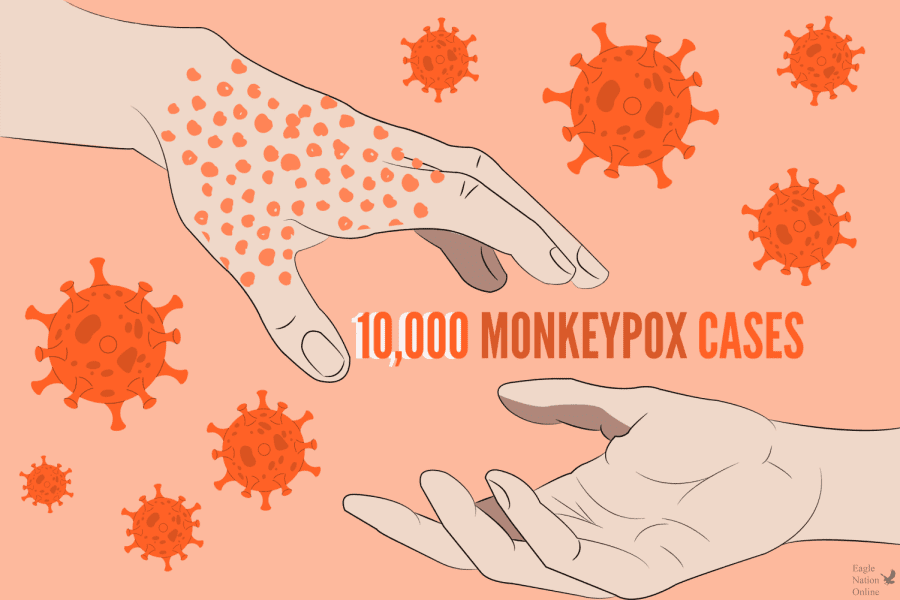Editorial: Texas citizens should be vigilant against monkeypox
A digitally constructed image displays the current United States Monkeypox case count. The local effect Monkeypox is described in junior Kaya Miller’s editorial. On behalf of the editorial board, Miller informs the public to be vigilant of Monkeypox but not to panic.
September 7, 2022
As COVID-19 seems to begin to fade, the public overlooks the new virus –monkeypox. United States citizens and Texas citizens specifically should be vigilant, but not to panic, about Monkeypox.
Against popular misconception, the Centers for Disease Control does not define monkeypox as a sexually transmitted disease. Through physical, close contact, touching objects touched by someone infected, and possibly respiratory secretions, the virus can be spread. The virus can last anywhere from two to four weeks.
The research on the poxvirus is limited as the outbreak is relatively new. Scientists are further researching respiratory secretion spread, and if it’s possible for someone to be asymptomatic.
Monkeypox originally arrived in the United States in 2003. Luckily, the virus did not exceed 80 cases at the time. The virus re-entered the country in May, and every state presently contains at least one case. The United States holds the most cases globally.
According to NBC, Dallas County declared monkeypox a public health emergency on Aug. 5.
According to the CDC, Texas has over 1,700 confirmed cases. Texas is within the top five states with the most confirmed cases in the country. Collin County has recorded 14 cases so far. The county traced the contacts of those infected thus a Disaster Declaration is unnecessary.
Men make up most of the demographic. With that, minorities make up about half of the cases. Despite the dominant effect on men through homosexual relationships, the virus can spread to anyone. Pets can also be subject to the virus, which can spread from humans and vice versa.
For example, Dallas recorded three children who contracted the virus. The rare contract of children does not require panic but demonstrates that the demographics are not limited to males.
Currently, vaccinations against monkeypox are reserved for those most vulnerable. Males who have had intimate contact with other males and those exposed to someone who tested positive for the virus are subject to the JYNNEOS vaccine. Similarly to Covid, a monkeypox vaccine drive-thru clinic opened at the Dallas County Health and Human Services headquarters. Collin County holds a limited supply, providing only to those directly exposed within the past two weeks.
Monkeypox news fills social media platforms – specifically Tiktok. Many have used Tiktok to spread awareness but with that, misinformation prevails. For instance, a woman who contracted monkeypox in a panic explained the fate of blindness from severe scarring of lesions on the eyes. Although blindness is a possibility, it’s not the ultimate fate if the case is handled correctly. Just as you should in any other scenario, the touching of the eyes should be avoided to prevent the contraction of any virus really; but also to prevent the spread of the lesions from the skin to the eyes. Comparably, monkeypox is less dangerous than Covid as death is rare.
Everyone should do personal research and stay up to date with reputable news sources and especially the CDC.
— Kaya Miller
The same precautions as Covid should not be taken for monkeypox, however, the public should still be aware. Texas citizens, along with the rest of the world, should look out for monkeypox symptoms: rashes with painful lesions, and flu-like symptoms – fever, respiratory symptoms, chills, and aches. If one experiences monkeypox symptoms, a health care provider should be contacted and the individual should self-isolate from others, including from pets. Preventative measures include practicing good hygiene by washing your hands often and limiting close contact with others or sharing contact with objects like utensils.





















